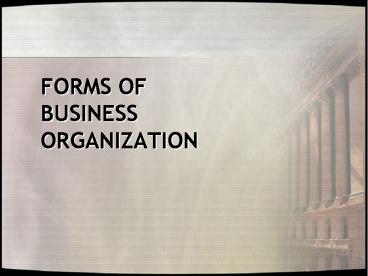FORMS OF BUSINESS ORGANIZATION - PowerPoint PPT Presentation
Title:
FORMS OF BUSINESS ORGANIZATION
Description:
FORMS OF BUSINESS ORGANIZATION FORMS OF BUSINESS ORGANIZATION Introduction and Understanding of Three Principal Forms of Business Organization Essential Attributes ... – PowerPoint PPT presentation
Number of Views:640
Avg rating:3.0/5.0
Title: FORMS OF BUSINESS ORGANIZATION
1
- FORMS OF BUSINESS ORGANIZATION
2
FORMS OF BUSINESS ORGANIZATION
- Introduction and Understanding of
- Three Principal Forms of Business Organization
- Essential Attributes and Characteristics
- Analyzing Business Needs and Selecting
Appropriate Business Form
3
Organizational Form Questions to Ask
- How many Owners will there be today? In the
future? - Costs to Form and Operate?
- Taxes Will there be any Income to tax? All
taxes come due eventually! - Is Limiting Liability Important? What kinds of
Liability Contractual or Tort (Express and
Implied Warranties)? - Obtaining Future Financial Capital?
4
FORMS OF BUSINESS ORGANIZATION
- Organizational Forms determined by
- Owners Objectives Liability, Profit
Distribution, Taxation and Capital Structure - Dealings with Outside World Other Owners,
Heirs, Employees, Customers and Future Owners
of Business - Legislative Goals Special-Purpose Entities to
encourage investments, in, for example, Small
Businesses or Affordable Housing
5
FORMS OF BUSINESS ORGANIZATION
- Three Organizational Forms developed by Business
Owners - Sole Proprietorship
- General Partnership
- Corporation
6
FORMS OF BUSINESS ORGANIZATION
- DEFINITIONS
Sole Proprietorship General Partnership Corporation
Any Business Owned and Operated by an Individual Two or More Persons Operating a Business for a Profit Legislatively Created and Regulated Governance, Ownership and Financial Structure
7
FORMS OF BUSINESS ORGANIZATION
- FORMATION
Sole Proprietorship General Partnership Corporation
No Formalities or Legal Documentation May be Implied from Conduct or Actions Written or Oral Agreement or May be Implied from Conduct or Actions Filing of Articles of Incorporation with Secretary of State and Payment of Fees
8
FORMS OF BUSINESS ORGANIZATION
- GOVERNING DOCUMENTS
Sole Proprietorship General Partnership Corporation
None Required None Required Most have Agreement specifying Rights, Duties and Obligations Articles of Incorporation create Corporation Bylaws prescribe its Operation
9
Articles of Incorporation
10
FORMS OF BUSINESS ORGANIZATION
- NATURE OF OWNERSHIP
Sole Proprietorship General Partnership Corporation
Wholly Owned by Single Individual For Contribution, Partner receives Proportionate Share of Profits/Losses and Partnership Property Residual Claim on Corporate Equity and Right to Vote for Directors and Essential Governance
11
FORMS OF BUSINESS ORGANIZATION
- LIABILITY
Sole Proprietorship General Partnership Corporation
Sole Proprietor Personally Liable for All Debts and Obligations Partners are Jointly and Severally Liable for all Partnership Obligations, in Contract and in Tort Shareholders Liability limited to Extent of Capital Contribution Limited Liability
12
FORMS OF BUSINESS ORGANIZATION
- TAXATION
Sole Proprietorship General Partnership Corporation
Not a Taxable Entity Income (Loss) passes through to Sole Proprietor Partnership not a Taxable Entity Allocations of Income and Loss allowed within Partnership before Pass-Through Corporation taxed as Separate Entity and Dividends/Capital Gains also Taxed Double Taxation
13
FORMS OF BUSINESS ORGANIZATION
- MANAGEMENT
Sole Proprietorship General Partnership Corporation
Sole Proprietor has Complete Management Control All Partners have Equal Rights in Partnerships Management and Conduct Managed by Board of Directors elected by Shareholders Board may Delegate Authority to Appointed Officers
14
FORMS OF BUSINESS ORGANIZATION
- TRANSFER OWNERSHIP INTERESTS
Sole Proprietorship General Partnership Corporation
Sole Proprietorship not Transferable Property and Products are Transferable Limited Right of Transfer subject to Consent by all Partners Freely Transferable through Formal (NYSE) and Informal (Private Equity) Capital Markets
15
FORMS OF BUSINESS ORGANIZATION
- WITHDRAWAL OF OWNER
Sole Proprietorship General Partnership Corporation
Terminates Sole Proprietorship Partner Death or Withdrawal may Terminate Partnership Corporation has Unlimited Life
16
- THE AGENCY PROBLEM
Occurs when (1) Goals of Principal and Agent
Conflict and (2) Principal cannot Verify what
Agent is doing
- Corporate Shareholders
- (Principal)
- Investor Maximum Returns
- (High-Risk/High-Return)
- Cannot operate Business
- Liability is Limited Can Lose only Investment
- Corporate Management
- (Agent)
- Manager Stable Returns
- (Low-Risk/Low-Return)
- Can operate Business
- Unlimited Liability Lose Job and Income
17
- FIXES FOR AGENCY PROBLEM
- Align Managers Interests with Shareholders with
Incentive-based Compensation (Bonuses) and Stock
Options linked to Corporations Performance - Improve Corporate Governance with Shareholder
Activism Change Rules for Nominating Directors - For Small Businesses Shareholders and Managers
required by Lenders to personally guarantee Loan
Repayment
18
- SPECIAL PURPOSE ENTITIES (SPE)
Limited Partnership Limited Liability Corporation (LLC) Subchapter-S Corporation
General Partner (Manager with Unlimited Liability) and Limited Partner (Investors with Limited Liability) Hybrid with Corporate Liability Protections and Partnership Tax Treatment Identical to Subchapter-C Corporation except Income/Losses Pass Through to Shareholders































